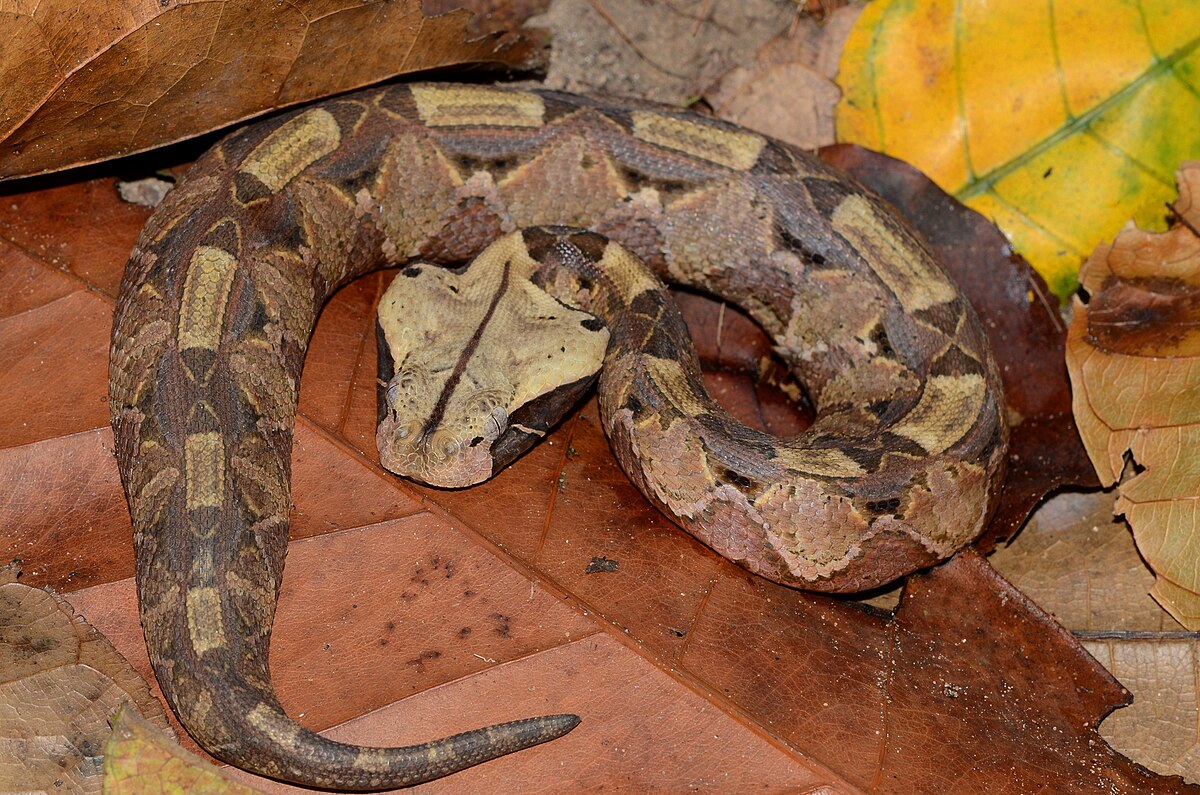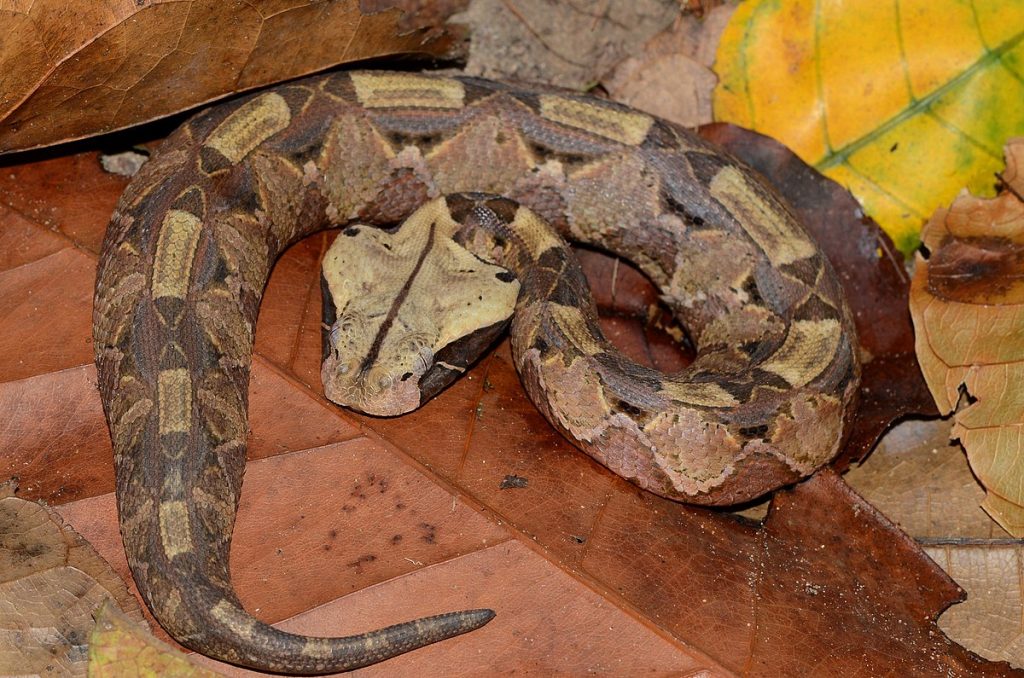Gaboon vipers are one of the most fascinating species of snakes in the world. With their striking coloration and impressive size, they can easily capture the attention of any onlooker. However, the question that often comes to mind is whether these snakes are venomous or not.
Venomous snakes are a cause of concern for many people, and rightly so. The venom of certain snakes can cause serious harm, and even death. In this article, we will explore the venomous nature of the Gaboon viper and provide you with all the information you need to stay safe in their presence. So, are Gaboon vipers venomous? Let’s find out!
Yes, Gaboon Vipers are highly venomous and known to have the longest fangs of any venomous snake in the world. Their venom is potent and can cause serious harm to humans. It is important to exercise caution and avoid contact with these snakes in the wild. Seek immediate medical attention if bitten by a Gaboon Viper.

Are Gaboon Vipers Venomous?
Gaboon vipers are among the largest and most venomous snakes in the world. They are known for their striking appearance and deadly bite. But are Gaboon vipers really venomous? Let’s explore this question in detail.
What is a Gaboon Viper?
Gaboon vipers are a species of venomous snake that are native to central and southern Africa. They are known for their large size, with some individuals growing up to six feet in length. Gaboon vipers have a distinctive appearance, with a broad, triangular head and a series of distinctive markings on their body.
Physical Characteristics of Gaboon Vipers
Gaboon vipers have a unique set of physical characteristics that make them stand out from other species of snakes. Here are some of the most notable features of Gaboon vipers:
- Large size: Gaboon vipers can grow up to six feet in length.
- Distinctive markings: Gaboon vipers have a series of unique markings on their body, including dark brown or black diamonds that are outlined in lighter colors.
- Broad head: Gaboon vipers have a broad, triangular head that is much wider than their neck.
- Large fangs: Gaboon vipers have long, curved fangs that can reach up to two inches in length.
Behavior of Gaboon Vipers
Gaboon vipers are known for their docile behavior. They are slow-moving and tend to stay in one place for long periods of time. Gaboon vipers are ambush predators, meaning they wait for their prey to come to them rather than actively hunting. They are most active at night and are rarely seen during the day.
Are Gaboon Vipers Venomous?
Yes, Gaboon vipers are highly venomous. They have one of the most potent venom of all snake species. Their venom is a complex mixture of toxins that can cause a range of symptoms in humans, including pain, swelling, and tissue damage. In severe cases, Gaboon viper venom can be fatal.
How Venomous are Gaboon Vipers?
Gaboon vipers are considered one of the most venomous snake species in the world. Their venom is highly toxic and can cause serious health problems in humans. The toxicity of Gaboon viper venom is measured using the LD50 test, which measures the amount of venom needed to kill 50% of test subjects. Gaboon viper venom has an LD50 value of around 0.4 milligrams per kilogram of body weight, making it one of the most potent venoms of any snake species.
Symptoms of Gaboon Viper Venom
The symptoms of Gaboon viper venom can vary depending on the amount of venom injected and the location of the bite. Common symptoms include:
- Pain and swelling at the bite site
- Discoloration or bruising around the bite
- Nausea and vomiting
- Dizziness or fainting
- Breathing difficulties
- Seizures or convulsions
How to Avoid Gaboon Viper Bites
The best way to avoid a Gaboon viper bite is to stay away from areas where they are known to live. If you do encounter a Gaboon viper, the best course of action is to give it plenty of space and back away slowly. If you are bitten by a Gaboon viper, seek medical attention immediately.
Preventing Gaboon Viper Bites
Here are some tips for preventing Gaboon viper bites:
- Avoid areas where Gaboon vipers are known to live, such as dense forests or areas near water sources.
- Wear protective clothing, such as long pants and boots, when hiking or working in areas where Gaboon vipers may be present.
- Use a flashlight at night to illuminate the area around you and watch for snakes.
- Be cautious when reaching into dark or confined spaces, such as rock crevices or hollow logs, where snakes may be hiding.
Gaboon Vipers vs Other Venomous Snakes
Gaboon vipers are often compared to other species of venomous snakes. Here are some of the key differences between Gaboon vipers and other venomous snakes:
Gaboon Vipers vs Rattlesnakes
Rattlesnakes are another species of venomous snake that are found in North and South America. While Gaboon vipers and rattlesnakes share some similarities, such as their venomous bite, there are also some key differences. For example, rattlesnakes have a distinctive rattle on the end of their tail that they use to warn predators or prey. Gaboon vipers do not have this feature.
Gaboon Vipers vs Cobras
Cobras are another species of venomous snake that are found in Asia and Africa. While cobras and Gaboon vipers share some similarities, such as their ability to inject venom with their fangs, there are also some key differences. For example, cobras are known for their ability to stand up and extend their necks in a threatening manner. Gaboon vipers do not have this ability.
Conclusion
In conclusion, Gaboon vipers are highly venomous snakes that are found in central and southern Africa. Their venom is one of the most potent of any snake species and can cause serious health problems in humans. If you encounter a Gaboon viper, the best course of action is to give it plenty of space and back away slowly. If you are bitten by a Gaboon viper, seek medical attention immediately.
Frequently Asked Questions:
What is a Gaboon Viper?
A Gaboon Viper is a venomous snake that is native to the rainforests and savannas of sub-Saharan Africa. They are known for their distinctive large, triangular-shaped head and their ability to camouflage themselves in their surroundings.
Gaboon Vipers are one of the largest species of venomous snakes in Africa, with adults reaching up to 5 feet in length. They are primarily active at night and feed on small mammals and birds.
How venomous are Gaboon Vipers?
Gaboon Vipers are highly venomous snakes and are considered one of the deadliest snakes in Africa. They have the longest fangs of any venomous snake, measuring up to 2 inches in length, and can inject a large amount of venom with a single bite.
The venom of a Gaboon Viper is a potent neurotoxin that can cause paralysis and respiratory failure. If bitten, it is essential to seek medical attention immediately.
What are the symptoms of a Gaboon Viper bite?
Symptoms of a Gaboon Viper bite can include severe pain and swelling at the site of the bite, as well as nausea, vomiting, and dizziness. The venom can also cause bleeding and tissue damage, and in severe cases, can lead to organ failure and death.
It is essential to seek medical attention immediately if bitten by a Gaboon Viper to receive appropriate treatment and antivenom.
How can I avoid a Gaboon Viper bite?
Gaboon Vipers are generally not aggressive towards humans and will only bite if they feel threatened or cornered. To avoid a Gaboon Viper bite, it is essential to give these snakes a wide berth and not to disturb them in their natural habitat.
If you are hiking or working in areas where Gaboon Vipers are known to live, it is essential to wear protective clothing and shoes and to be cautious when stepping over logs or rocks where snakes may be hiding.
What should I do if I encounter a Gaboon Viper?
If you encounter a Gaboon Viper in the wild, it is essential to give the snake plenty of space and not to startle or provoke it. Back away slowly and allow the snake to move away on its own.
If you or someone you know is bitten by a Gaboon Viper, seek medical attention immediately. Do not attempt to suck out the venom or use a tourniquet, as these methods can do more harm than good.
In conclusion, it is without a doubt that Gaboon vipers are venomous. These snakes are known for their potent venom, which can cause severe harm to humans and other animals. Gaboon vipers are not to be underestimated, and any encounter with them should be handled with caution and the help of professionals.
Despite their dangerous nature, Gaboon vipers are fascinating creatures with unique characteristics. Their camouflaged scales and long fangs make them stand out in the snake world. It is important to respect their space and acknowledge their role in the ecosystem.
In summary, Gaboon vipers are venomous snakes that should be approached with caution. While they may be dangerous, they are also intriguing creatures that play an important role in our environment. It is crucial to educate ourselves and others on their existence and how to safely coexist with them.


